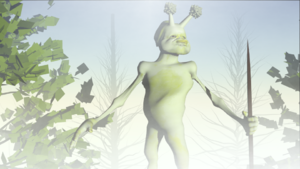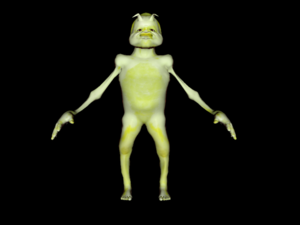Imab-Adred-Nas: Difference between revisions
Newzimiagov (talk | contribs) No edit summary |
Newzimiagov (talk | contribs) No edit summary |
||
| Line 1: | Line 1: | ||
[[File:Imabadredscene0001.png|300px|thumb|left| | [[File:Imabadredscene0001.png|300px|thumb|left|Pictured: A male Imab-Adred-Nas wanders through the forest in search of mate.]] | ||
[[File:Imabadred.png|thumb|Given its high levels of intelligence, many advocates have called for the government to pass legislation recognizing the rights of the Imab-Adred-Nas.]] | [[File:Imabadred.png|thumb|Given its high levels of intelligence, many advocates have called for the government to pass legislation recognizing the rights of the Imab-Adred-Nas.]] | ||
[[File:RangeImab.png|thumb|In red, the known range of the Imab-Adred-Nas.]] | [[File:RangeImab.png|thumb|In red, the known range of the Imab-Adred-Nas.]] | ||
Revision as of 01:36, 11 April 2017
Common across the region’s wetlands, the Imab-Adred-Nas is one of only a few indigenous animals to have been domesticated. A medium-sized, bipedal creature, this creature can often be seen in the nation’s cities, helping citizens with their daily tasks such as carrying shopping bags home from the store. Considered one of the most intelligent creatures in the region, aside from humans, explorers working for Corum Expeditions have reported finding tribal communities of Imab-Adred-Nas, in remote areas such as along the shores of Lake Norton. During mating season, males of the species produce two large, white bulbs on their head. Those males that produce the largest, whitest bulbs, tend to attract the largest amount of mates.
Found in 11 out of 20 Pallisican cities in Corum, this species is very common.


